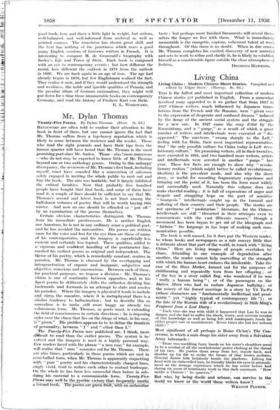Mr. Dylan Thomas
Twenty-Five Poems. By Dylan Thomas. (Dent. 2s. 6d.) REVIEWERS are often told to confine their attention to the book in front of them, but one cannot ignore the fact that Mr. Thomas suffers from a top-heavy reputation which is likely to come between the reviewer and the reader. Those who read the right journals and have their tips from the inmost quarter will have heard that Mr. Thomas is the most promising poet since Mr. Auden. Those—alas ! more numerous —who do not may be expected to know little of Mr. Thomas beyond one or two anthology poems. "owing to this unhappy discrepancy, the reviewers of .Mr. Thomas's first book, including myself, must have sounded like a convention of salesmen solely engaged in inciting the whole public to rush out and buy the book. The aim was laudable, but it largely inhibited the critical faculties: Now, that - probably five hundred people haVe bought that first book, and some of them have read it, a couple of lines should be sufficient to say that Mr. Thomas's second and latest book is not least among the half-dozen volumes of poetry that will be worth buying this winter. And, now no one should be offended or "put off" by an examination of the poems themselves.
Certain obvious characteristics distinguish Mr. Thomas from his immediate predecessors. He is neither English nor American, he is not in any ordinary sense a political poet, and he has avoided the universities. His poems are written more for the voice and less for the eye than are those of many of his contemporaries," and his -imagery is superficially less esoteric and certainly less topical. These qualities, added to a•- vigorous and confident handling of the pentameter line, marked his earliest poems as original and independent. The theme of his poetry, Which is remarkably constant, centres in paradox. Mr. Thomas is obsessed by the overlapping and interpenetration of organic and inorganic, subjective and objective, conscious and unconscioui. Between each of these, for practical purposes, we impose a division : Mr. Thomas's . vision is one of continuity between opposites, and in his finest poems he deliberately shifts the orthodox dividing line, backwards and forwards • in an attempt- to state and resolve his paradox. Where the imagery is physical it tends to include and stress_ the macabre, where' it is metaphysical there, is a similar tendency to hallucination.-; but to desCribe this as surrealism is to make still more baggy an already too voluminous term. Mr. Thomas, as poets must, is extending the field of consciousness in certain directions : he is imposing
order over the chaos that lies on the fringe of what, in his case, - — - -
/966 given." • problem appears to be to define the frontieis.
o' personality, between " I " and "other than L". -
The Twenty-Five Poems now published are, I think, more difficult to- read- than the earlier poems. The syntax is in-" volved and the -imagery is used in a highly personal way. _Few readers—faced with the phrak "a ram rose," for example,' will realise that " ram " connotes red for Mr. Thomas. There are also times, particularly in those poems which are cast in semi-ballad form, when Mr: Thomas is apparently Coquetting with " pure " poetry and his characteristically charged lines, singly vivid, tend to reduce each other to mutual burlesque. On the whole he has been less successful than before in sub- duing his material to a communicable form. Twenty-Five'- Atm may well be the ELvirhic victory-that Awe/11y _marks' .
• sa • .er< •
a reFoitd liabk:—The poems- are green &aft, with an unfaniiliar taste ; but perhaps more finished lineaments will reveal them- selves the longer we live with them. What is immediately memorable is the energetic, copious, vehement talent at work throughout. Of this there is no doubt. When in due course Mr. Thomas completes his excited discovery of new material and sets to work to refine and clarify it, he is likely to establish himself as a considerable figure outside the close atmosphere of
















































 Previous page
Previous page